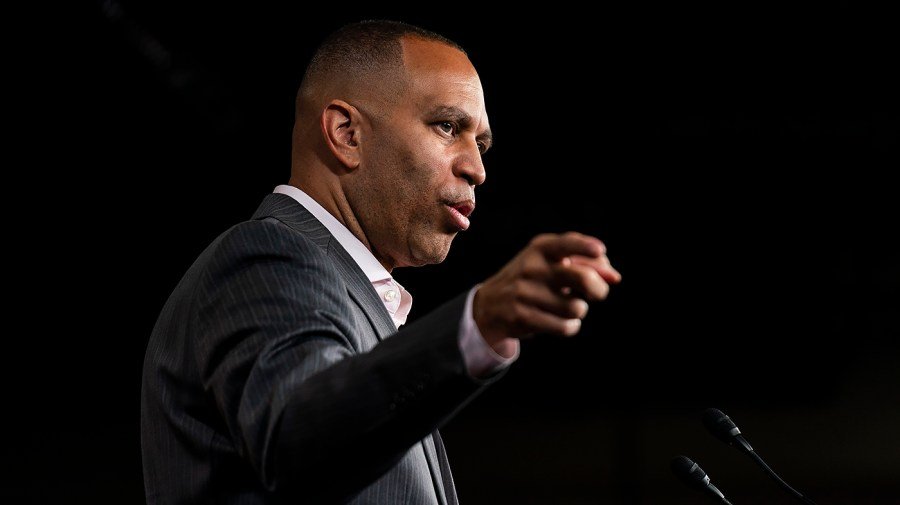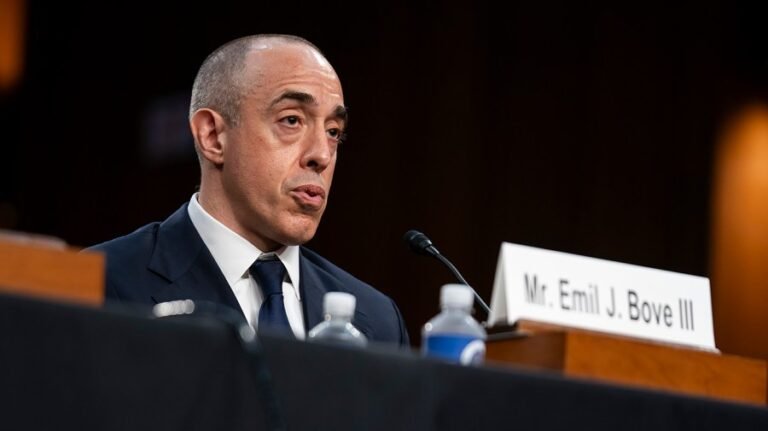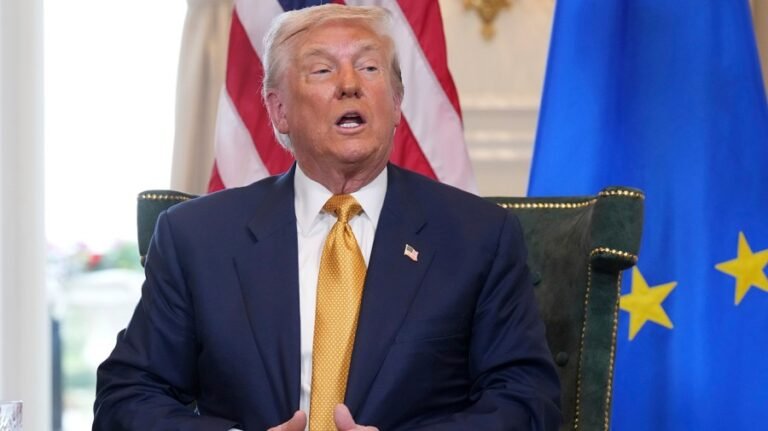
House Democrats are cranking up the pressure on their Senate colleagues to hold the line against any Republican spending bills, warning that support for partisan legislation would prove more harmful than a potential shutdown — and trigger an outcry from the party’s already deflated base.
House Democrats were virtually united against a GOP spending package in March, only to see Senate Democrats — most notably Senate Minority Leader Chuck Schumer (D-N.Y.) — help Republicans advance it into law. The episode infuriated Democrats in and out of Congress, eroded trust between the chambers and raised some questions about Schumer’s future at the top of the party.
Yet with another spending battle brewing for September — and Republicans already eyeing steep federal cuts anathema across the aisle — House Democrats are holding out hope that this time will be different.
House Minority Leader Hakeem Jeffries (D-N.Y.) is already warning that a Republican-only spending package is “dead on arrival.” And even those lawmakers most critical of Schumer’s strategy in March are predicting the chambers will be united when the battle heats up ahead of the Oct. 1 shutdown deadline.
“Leader Jeffries putting that strong line down is something I support, and something I think that our whole party will rally around,” said Rep. Alexandria Ocasio-Cortez (D-N.Y.), who had scorched Schumer’s handling of the earlier debate.
Democrats are pointing to two reasons why they think the current spending fight might play out differently from the one in March, when Schumer joined nine other Senate Democrats to advance the Republican spending bill.
First, the recent GOP efforts to claw back funds already approved by Congress has united House and Senate Democrats, who are accusing Republicans of violating bipartisan deals negotiated in good faith.
Those so-called rescissions have diminished the Democrats’ trust in President Trump and Republicans to honor spending agreements, even when both parties are on board, while giving Democrats plenty of ammunition to justify their opposition to GOP-only bills. Russell Vought, Trump’s budget director, has fueled those arguments by recently advising Republicans to abandon bipartisanship in setting federal spending.
“My hope is that, due to what has happened — especially with the Republicans using rescissions to essentially renege on deals that were made before … the Senate sees that and says, ‘They’re not operating in good faith,’” said Rep. Maxwell Frost (D-Fla.).
Others pointed to Trump’s record of shifting funds — or simply refusing to spend money on the programs Congress intended — as reason for Senate Democrats to reject any spending bills that lack bipartisan buy-in — or guardrails that would ensure funds go where they’re directed.
“Right now, we have a president that’s operating outside of the bounds of the law and the Constitution — a president that doesn’t give a damn about checks and balances, doesn’t give a damn what you actually pass, he’s going to do whatever he wants,” said Rep. Jimmy Gomez (D-Calif.). “So why are you going to help the Republicans pass something that’s going to be devastating? And then he’s going to take it a step further?”
Secondly, in light of the outcry that followed Schumer’s actions in March, many Democrats suggested he simply couldn’t survive another round of internal attacks.
“I had a phone call last night about this issue. [The caller said], ‘Well, Schumer is probably going to fold.’ And I said, ‘No, no, he’s not going to,’” said Rep. Emanuel Cleaver (D-Mo.).
“His future might hinge on this, but I also think that it will be the most obvious thing for him to do,” he continued. “I think he realized that our base is not going to tolerate us just rolling over and rolling over.”
Schumer, in recent days, has taken long strides to reassure fellow Democrats that he’s ready for a fight. In floor speeches and press conferences, the Senate’s top Democrat has warned Majority Leader John Thune (R-S.D.) that partisan spending bills, to include rescissions, have threatened to destroy a decades-old tradition of bipartisan appropriations. Schumer is also going out of his way to align himself with House Democrats on the issue.
“We’re in agreement. We all want to pursue a bipartisan, bicameral appropriations process,” Schumer told reporters after a meeting with Jeffries. “That’s how it’s always been done successfully, and we believe that should happen.”
His words haven’t been overlooked by House Democrats, who are cheering Schumer’s warning shots delivered so far ahead of the shutdown deadline. Their focus on the Senate is practical: The filibuster is the single most powerful tool available to the minority Democrats, and only the Senate has access to it.
“He seems to be setting forth, well in advance of the deadline, what his bottom lines are,” said Rep. Joe Morelle (D-N.Y.). “I appreciate what he’s saying that they have a slightly different role in that they can actually stop this. At the same token, they can actually stop this, and insist on a more bipartisan approach.”
In March, Schumer made the calculation that allowing the government to shut down — and risk having Democrats be blamed — would prove more harmful than enduring the inevitable friendly fire from liberals that would come from supporting the GOP package. This time around, some Democrats say he has much more cover.
“I have confidence in Sen. Schumer, because I think that was then and this is now. And now, I think, it is clear that we — on both sides [of the Capitol] — should stick to our core values and vote no,” said Rep. Adriano Espaillat (D-N.Y.).
“I understand his concern back then,” he added. “But I think public opinion, and of course reality, shows that the American people are willing to understand a shutdown, because they also understand that the details of many of these spending bills are horrific, and that it would impact their personal lives.”
Jeffries, for his part, is vowing that House Democrats will be united against partisan GOP spending bills. And he’s predicting that, this time, Democratic senators will be allies in that fight.
“A partisan spending bill is dead on arrival in terms of securing significant Democratic support or any Democratic support in the House,” he said, “and I believe that that is the case in the Senate, as well.”
Most Democrats seem to agree, but there are also signs that the distrust created in March is still lingering ahead of the next shutdown battle.
“This is politics, so you can only trust people as far as you can throw ’em. And especially senators,” Gomez said.
“Call me crazy, but I don’t like cutting deals with somebody that continues to be punching me in the face and then says that they’re doing me a favor,” he added. “And that’s what Donald Trump does to the Senate Democrats every time they capitulate on that kind of … legislation.”


